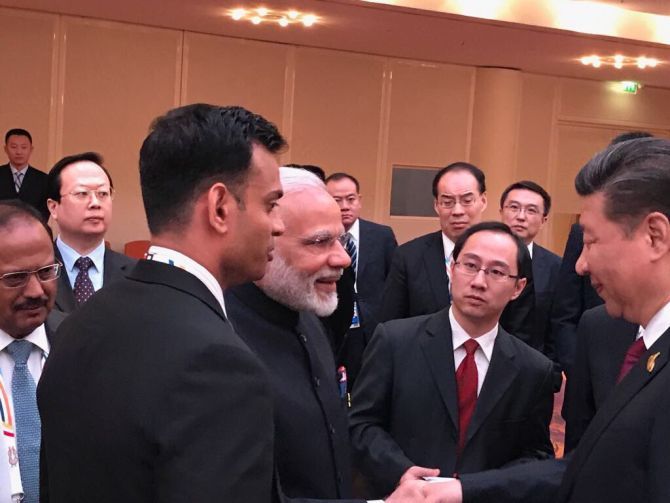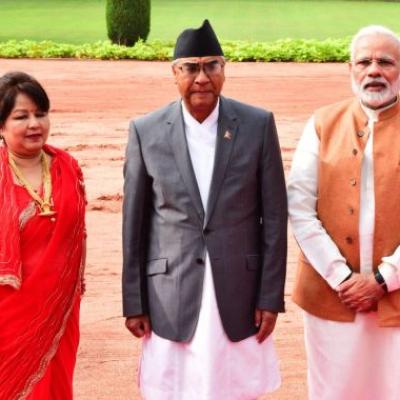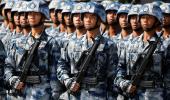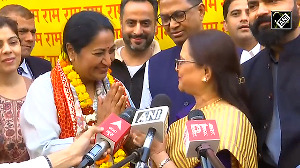'Neither State should take the matter into a terrain that involves tension -- and certainly not war.'

Nepal's Deputy Prime Minister Krishna Bahadur Mahara of the Unified Communist Party of Nepal Maoist, tells Aditi Phadnis that Kathmandu is looking to leverage the economic gains of the Belt and Road Initiative.
What is your assessment of Prime Minister Sher Bahadur Deuba and your India visit?
It was a five-day visit. We met all important leaders -- the prime minister, foreign minister, President, vice-president... We got a lot of respect and attention from the Government of India.
We signed eight agreements with the government. There is a package of four agreements on health, culture, education and housing.
We have agreed to cooperate on narcotics control. There is one agreement on standardisation. And one on a bridge on the river Mechi.
There is an agreement between the chartered accountant bodies in the two nations.
We also discussed a lot of bilateral issues.
Of particular interest is the agreement between the two prime ministers that floods are a common problem for the two countries and there must be a permanent joint mechanism to study this.
We have set up a group and it will submit its report soon.
The other issue that came up was the Pancheshwar hydel power project, discussions on which have been going on for the past 18 years. We wanted to go ahead with this.
Narendra Modiji said he would take it up with his colleagues.
True, there was no agreement on this, but it has been revived and flagged as a matter of interest.
Overall, we consider this a successful visit.
Lately, there has been a lot of discussion here about the activities of China, which is also a neighbour of Nepal.
Some observations of China that they might enter the Kalapani area (a subject of dispute between India and Nepal) has been interpreted as a threat by India.
Did this matter come up at all?
How would you like India to behave with China so that Nepal feels reassured and safe?
First, this matter was not discussed. This was a bilateral visit and we did not want any other country's issues to intrude.
You referred to the border issue. Nepal's view is crystal clear.
This is a matter for the two affected parties to sit together and discuss -- in a peaceful, diplomatic dialogue.
Neither State should take the matter into a terrain that involves tension -- and certainly not war.
Only if India and China progress together will Nepal benefit.
If there is a problem, it must be resolved via dialogue, peacefully.
Was any reference made to Lipu Lekh?
No discussion at all.
 At a venue where Deuba (seen left with his wife and Prime Minister Narendra D Modi) was present, an Indian minister referred to Chinese activities on the border.
At a venue where Deuba (seen left with his wife and Prime Minister Narendra D Modi) was present, an Indian minister referred to Chinese activities on the border.
Deuba sharply contradicted the minister and set the record straight by saying that Nepal's relations with China were excellent.
How do you see this divergence of opinion?
Yes, I also heard this and this was a topic of discussion. But this should not have been a matter of discussion in that venue during this trip.
We could have discussed relations between India and Nepal. But that was not the place to discuss the affairs of third countries.
So whatever discussion took place, it must be closed there.
You have visited China, you were part of the conclave that country hosted on BRI. India stayed out of it.
What is your impression of what China wants to achieve? Should India and the rest of the world be worried about BRI?
First, while the Government of India did not attend, there were a lot of Indian private sector companies that did participate.
As far as China goes, BRI is a way for China to expand business; I do not believe it wants to create zones of geographical interest or influence.
From this point of view, we see it as a positive development.
Nepal can see China's rapid economic progress. We would like to leverage the benefits of this progress.
What benefit can we get? Nepal is not a rich and wealthy country, despite all our natural resources. But that doesn't mean we want to be poor permanently.
We also want to grow economically, ensure a better deal for our people. So we want to explore how China's economic growth can help us grow.
We view India in the same way.
We want to accept and adapt everything that a growing economy in our neighbourhood or elsewhere can offer us, to improve the lot of our people.
Nepal and India have a unique relationship that defies description.
There are family ties, contiguity, a security relationship. But relations tend to turn sour now and then.
In today's context, this relates to the rights of the people of Terai-Madhes. How do you see this?
Sometimes, quarrels break out between two people who have the closest possible relationship. This is natural.
When there are two dishes in a kitchen cupboard, they will clash and make a noise.
India has helped Nepal a lot and has got a lot of help from Nepal in return.
Recently all that has happened, especially in the context of the Madhesi issue, I think the Madhesi issues are getting resolved slowly.
We tried to overcome some resistance to the rights of the Madhesi people by including some modifications in the constitution. This was unsuccessful.
But this does not mean the problems of the Madhesi people will remain unresolved forever.
For instance, the Madhesi parties decided that in the forthcoming elections, they will keep their issues before the people but will participate in the election in a democratic manner.
Deuba flagged this issue in a transparent way here as well. He conceded that efforts to modify the constitution had not been successful, but said he would address it afresh.
We told the Government of India as well that we have had one round of elections and we expect your good wishes for them as well as the ones we are going to have in the future.
Good wishes not just in terms of logistic technicalities, but also politically.
I was so happy to hear the Indian statement 'You (Nepal) have conducted an election. This is very good, thank you'. This will help our elections to be representative and inclusive.
vThe election cycle in Nepal consists of three levels -- local, provincial and federal.
The third and last phase of the local elections will be completed by the end of September.
The provincial and federal elections will follow simultaneously, beginning in November.
All Nepal is immersed in elections right now.
How do you see the outcome of the elections? Who will be PM?
(Laughs) I cannot say anything now. We would want our party to be the largest, contributing the prime minister.
But one thing I can say with certainty: After this election, Nepal will break from its past of unstable governments and the government that comes to power will rule for five years.
In India, there is anxiety that violence might return to Nepal.
Absolutely not. That phase is over. Violent politics will not return to our country.
IMAGE: Prime Minister Narendra Modi and Chinese President Xi Jinping at the G-20 summit in Hamburg, July 7, 2017.












 © 2025
© 2025